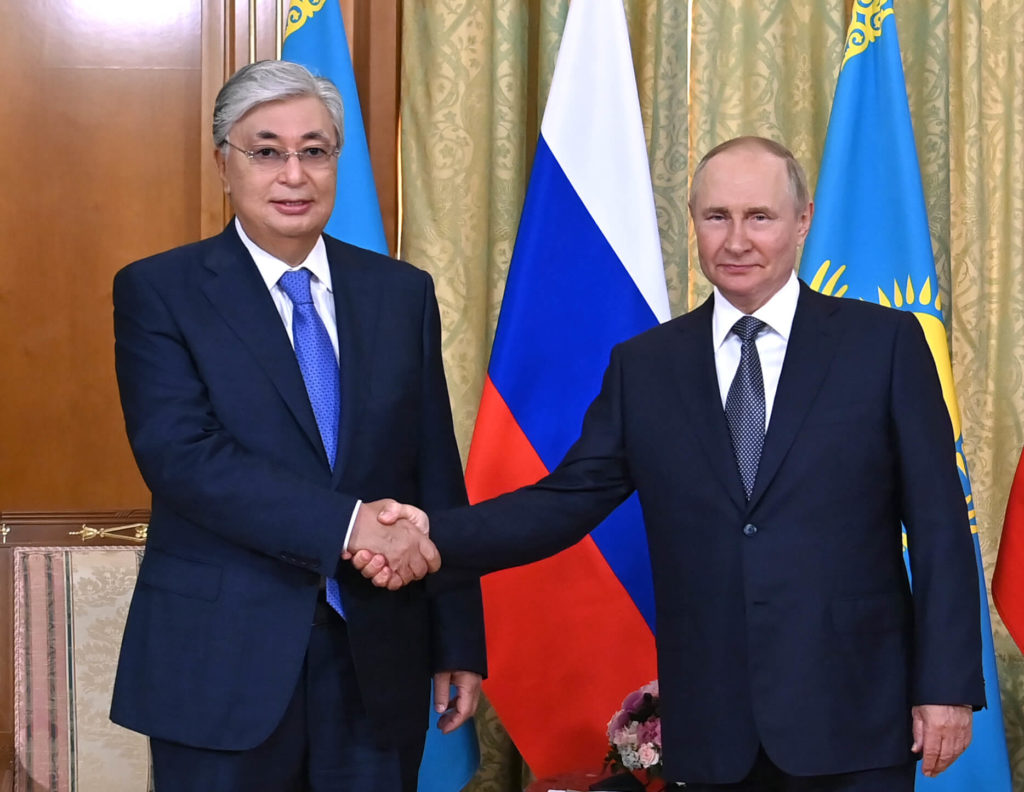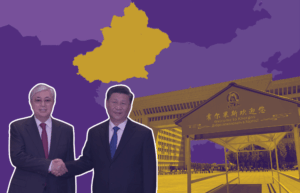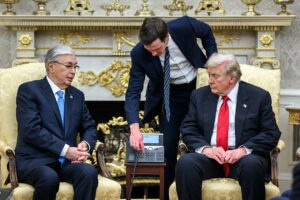Since the invasion, Kazakhstan has taken a position of neutrality towards Russia’s war in Ukraine. Yet, Astana has not hindered volunteers from organising humanitarian aid to send to Ukraine. Furious remarks from Russia about this ambiguity have placed Kazakhstan at the epicentre of a targeted (dis)information campaign. The following article appeared 20 August, 2022 in Fergana News. We have translated it with friendly permission from the editors. Recently three ambulances arrived in Ukraine from Kazakhstan. The Telegram channel “Ateo Breaking” reported that the vehicles were sent by authorities from the Central Asian country to help Ukraine, where Russia is conducting a “special military operation.” But in fact, the Kazakh government had nothing to do with this aid package. The vehicles were financed by Kazakh businesspeople, according to information shared by the Ukrainian Ministry of Health and the Ukrainian Embassy in Kazakhstan. Transport to Ukraine was organised by the NGOs “Ukrainian American House,” “Initiative E+,” and the Victor Pinchuk Foundation.
Solidarity with Ukraine from below
From the beginning of the “special operation,” Kazakh authorities distanced themselves from any involvement in the conflict. The acting Minister of Defence Sultan Kamaletdinov made clear remarks in this regard: “We do not support any side. There can be no questions about this.” However, not all Kazakhs agree with his point of view. Since the beginning of the war, hundreds of volunteers and those sympathetic to the Ukrainian cause have sent humanitarian aid to areas in need via the Ukrainian Embassy in Kazakhstan and collected donations for victims. What is important to emphasise is that these are citizens’ initiatives that are not supported by the government. Reception centres for Ukrainian refugees are currently active in 11 cities: Karaganda, Oral, Semei,Oskemen, Aktau, Turkistan, Atyrau, Ekibastuz, Aktobe, Almaty and Astana.
At the beginning of June, Kazakhs sent humanitarian aid to Ukraine via several planes and 11 trucks. The total volume of this delivery was over 200 tons and included toiletries, food, medicine, and more. Within Kazakhstan itself, charity concerts in support of Ukraine have been organised. But since these have unsettled local authorities, gaining permission for such initiatives is difficult. During a charity run on 24 August 2022, money was collected to rebuild schools in Chernihiv Oblast. Officially, Astana has not involved itself in such activities. In spring last year, the Kazakh authorities only sent three cargo planes to Ukraine with medicine, food, and bedding. So far, the government’s policy of neutrality has resulted in a ban on rallies in support of Ukraine, while prosecuting people who display Z or V stickers (letters which are signs of support for the “special operation”). Read more on Novastan: Kazakhstan’s gradual divorce from Russia The longer the “special operation” continues, the harder maintaining such balance will be. The “big neighbour” is making it increasingly clear that it expects a different, preferably more supportive stance from Kazakhstan with regard to the military conflict. In spring 2022, well-known media personalities accused Astana of Russophobic policies and treason. Now dozens of popular Telegram channels have become involved in fuelling anti-Russian sentiment by publishing either outright lies or distorted information on the daily, that are picked up by Russian media without any fact-checking. For example, the story about the ambulances mentioned above was run by the state-run online newspaper Gazeta.ru. They even stated on Twitter that the vehicles were sent by Kazakh authorities for use by the Ukrainian armed forces.
Purported weapons’ sales
Another news article claimed that Kazakhstan was selling weapons to the United Kingdom, for them to be subsequently shipped to Ukraine. Documents related to this story were published at the beginning of August by the pro-Russian hacker group Beregini. The deal was supposedly carried out thanks to the mediation of the company “Technoexport”. First this “news” was picked up by Russian Telegram channels, after which mainstream media started publishing about it. Kazakhstan’s Ministry of Industry and Development of Infrastructure denied the accusations immediately and shared that neither “Technoexport” nor any other company had been licensed for the export of weapons to the UK. The permit necessary for the re-export of weapons was also not issued by the ministry. The Russian Telegram channel “Rybar”, however, described the ministry’s statement as “unfounded” and after “digging” through the Technoexport documents, discovered that the company – contrary to the Kazakh rebuttal – was indeed in the possession of the licenses and permits required for export to the UK. Read more on Novastan: The war in Ukraine and its consequences for Central Asia“It does not matter if the official representatives of the Kazakh government are defending themselves by saying that they could not export Soviet weapons without the producer’s – that is, Russia’s – permission. They are doing it all behind closed doors,” wrote the authors of the Telegram channel, which boasts over a million followers. In other words, the Kazakh authorities were being accused of lying not by Russian law enforcement agencies, neither by government leaders, nor by popular media, but instead by a Telegram channel whose anonymous editors know that they will not be prosecuted for their allegations.
“Wild Mambets”
A painful story of child abuse in Kazakhstan developed along similar lines. A group of teenagers in Almaty abused two brothers, aged four and nine, by forcing them to perform oral sex. The mother of the boys turned to the foundation NeMolchi.kz and journalists to receive help, in addition to filing a report with the police. Later, however, a video of the mother appeared on the Telegram channel “Mnogonational” under the title “In Kazakhstan wild Mambets [editor’s note: Mambet is derogatory slang for an uncultivated, uneducated person of Central Asian heritage] forced small Russian children […] to perform oral sex on the playground and recorded it with a camera.” The story was taken up by Russian TV station Tsargrad, which announced it was “another case of the escalating manifestation of Russophobia in Kazakhstan. This time Russia-haters took their dirty deeds to the limit – Russian children have suffered.” The twisted story was broadcasted on the station and later similarly referenced to by other Russian media outlets. Read more on Novastan: Mambet – The Central Asian N-word: Where it comes from and what it means Then the mother of the victims stepped forward with a counterstatement. The woman called the publication and broadcast a provocation. “All of those involved in the incident were of European ethnicity, but you cannot give this any interethnic stain. I have lived in Kazakhstan since birth and have many friends of other ethnicities. We all live in peace,” she said. Who is responsible for the provocation remains unclear, since the Telegram channel “Mnogonational,” which first spoke of “wild Mambets,” is anonymous. The authors of the channel claimed multiple times that the mother of the children was forced to make a counterstatement. Of course, they did not provide any proof for this claim.
The hot topic of language
The government-friendly Russian public has seized upon yet another hot topic in the relationship between the two countries: language. Messages started circulating on social media stating that Russian-language instruction in Kazakhstan’s schools would disappear in the next six to seven years. Media outlets such as Glas.ru and Tsargrad reported about this as well. As it turned out, these messages were based on a wrong interpretation of a two-year-old report from the Kazakh Channel 31. Kazakhstan’s Ministry of Education denounced the fake news, but several days later the problem of Russian language in schools resurfaced. After a statement from Minister of Education Ashat Aimagambetov on 16 August, social media and Telegram channels spread the news that starting in 2022, Kazakh pupils in first grade would not be taught Russian, while learning Kazakh remained obligatory. In fact, the minister only referred to schools with Kazakh as the language of instruction. This important detail was deliberately left out by a number of media outlets. Large Russian media agencies, such as TASS, published about the correct version of the announcement, but the fake story had already received considerable media attention. Read more on Novastan: Kazakhstan’s slow yet determined transition to the Latin alphabet Furthermore, in an interview with Nur.kz in early June, Minister Aimagambetov reemphasized that starting with trilingual classes in the first grade might be too difficult for pupils. Therefore, he added, was decided to introduce the different languages at Kazakh-language primary schools one at a time. “We made a decision on this issue and are already working to ensure that a child in a school with Kazakh as the language of instruction is only learning one language in first grade: Kazakh. That means they learn to read and write in their native language. In second grade, Russian is introduced, and in third grade, English,” explained the minister. This important nuance was omitted in Russian media.
A (dis)information campaign
There are many more examples of Russian disinformation in Kazakhstan, but these stories stand out with regard to the amount of media attention they have received. There was also a deleted post on the social media site Vkontakte by former Russian President Dmitry Medvedev, who currently is deputy chairman of the Security Council of Russia. In this post, he claimed that Kazakhstan was an “artificial state,” whose authorities pursue a policy of “Russian genocide.” (The post was deleted 10 minutes after publication and was said to be the result of a hack, as stated by the press service of Vkontakte and Medvedev himself.) There is a lot of disinformation floating on Telegram channels and Russian news websites, such as the story about the alleged murder of a Russian boy in Astana by Kazakh children. The article was accompanied by a video of a fight from last year in which no one was killed. The amount of fake news has grown exponentially in recent months. Hence, it is best to speak of a planned (dis)information campaign. Russian officials reject such accusations outright. President Vladimir Putin has repeatedly referred to Kazakhstan as a “strategic partner” and his press secretary called the country a “friendly state.” On 19 August, Kazakhstan’s President Kassym-Jomart Tokayev met Vladimir Putin in Sochi. At the meeting, the two presidents hugged. Later Tokayev said that he was satisfied with the development of cooperation between the two countries. Tokayev was quoted saying: “We are bound by the entire border – the longest fully demarcated land border in the world.We cannot allow any pessimistic prognoses over the future of our cooperation! As President of the Republic of Kazakhstan, I am personally dedicated to giving additional impetus to our bilateral cooperation in all areas.”
Fergana News
Translated from Russian into German by Robin Roth
Translated from German into English by Mari Paine
Edited by Julian Postulart
For more news and analysis from Central Asia, follow us on Twitter, Facebook, Telegram, Linkedin or Instagram.
 “An escalating manifestation of Russophobia” – Kazakhstan at the epicentre of an information war
“An escalating manifestation of Russophobia” – Kazakhstan at the epicentre of an information war 



